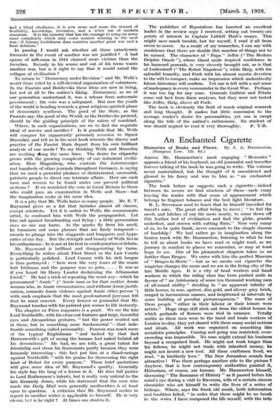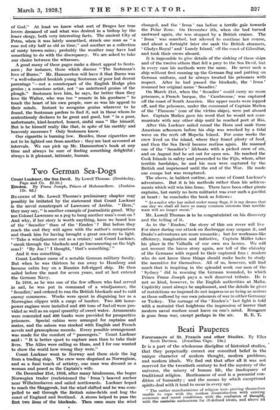An. Enchanted Cigarette
Memories of Books and Places. By J. A. Ilammerton. (Sampson Low. 12s. 6d.)
Amotio Mr. Hamznerton's most engaging " Memories " appears a friend of his boyhood, an old journalist and traveller forever talking of the book he was going to write. The volume never materialized, but the thought of it smouldered and glowed in his fancy and was to him as " an enchanted cigarette."
The book before us suggests such a cigarette—indeed between its covers we find nineteen of them—each essay leaving the reader with that sense of appeasement which belongs to fragrant tobacco and the best light literature.
R. L. Stevenson used to boast that he himself travelled for travel's sake. The great affair being to move ; " to feel the needs and hitches of our life more nearly, to come down off this feather bed of civilization and find the globe, granite underfoot, and strewn with cutting flints." Now very many of us, to be quite frank, never succumb to the simple charms of hardship ! We had rather go in imagination along the beaten track with Mr. Hammerton, listening to what he has to tell us about books we have read or might read, as we journey in comfort to places we remember, or may at least hope to see. One of his pleasantest chapters takes us no further than Bruges. We enter with him the perfect Museum of " Bruges-la-Morte "—but as we smoke our cigarette the magician changes the scene and we are in the living city of the late Middle Ages. It is a city of head workers and hand workers in which the ruling class has been pushed aside in favour of " an Aristocracy of some ten thousand working men of all-round ability " dwelling in " an apparent infinity of little homes, in rose, apricot, dim gold, and silvery grey brick, ranged in harmonious masses, and heightened at intervals by some building of peculiar picturesqueness." The mass of these people " either in their labour or their leisure were artists." Huge rings still stick out from the oldest houses to which garlands of flowers were tied in summer. Totally unlike as these men were to the hand and brain workers of London to-day, they yet shared with them many social notions and ideals. All work was organized on something like socialistic principles. Coming and going was restricted, over- crowding was impossible. No man might extend his business beyond a recognized limit. He might not work longer than his fellows, he might not trade with inherited money, he might not invent a new tool. All these craftsmen lived, we read, " in brotherly love." The New Jerusalem sounds less attractive ! Was there perhaps another side to the picture Anyhow, that is how contemporary authorities painted it, Historians, of course, are human. Mr. Hammerton himself, discussing " The Romance of Histoiy " as it passed before his mind's eye during a visit to Ravenna, tells of a certain sincere chronicler" who set himself to write the lives of a series of bishops. Where, says the frank old monk, both information and tradition failed, " in order that there might be no break in the series I have composed the life myself, with the help
of God." At least we know what sort of Bruges her true lovers dreamed of and what was desired in a bishop by the lesser clergy, both very interesting facts. The ancient City of Petra, when it was lately unearthed, struck one man as " a rose red city half as old as time," and another as a collection
of misty brown ruins; probably the weather may have had something to do with the discrepancy. We are asked to take our choice between the witnesses.
A good many of these pages make a direct appeal to Scots- men ; for instance, those which discuss " The Scotsman's love of Burns." Mr. Hammerton will have it that Burns was " a well-educated bookish young Scotsman of poor but decent parentage "—not a counterpart of the English Hodge plus genius ; a conscious artist, not " an unlettered genius of the plough." Scotsmen love him, he says, far better than they love Sir Walter, who was too " remote in his goodness " to touch the heart of his own people, sure as was his appeal to their minds. Instant to recognize genius wherever to be found, the Scotsman prefers to find it, not in those whom he sententiously declares to be great and good, but " in a poor, unfortunate, kind-hearted, honest, sinful man " hire himself. But is he himself really like that, in spite of his earthly and heavenly successes ? Only Scotsmen know.
Our cigarette is burning low. Besides, these cigarettes are not to be lighted one from another : they are best savoured at intervals. We can pick up Mr. Hammerton's book at any time and always be sure of finding something delightful : always is it pleasant, intimate, human.































































 Previous page
Previous page